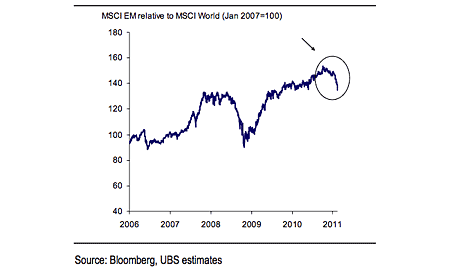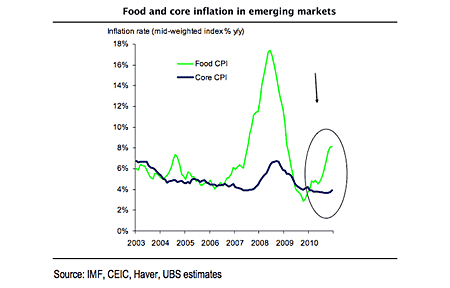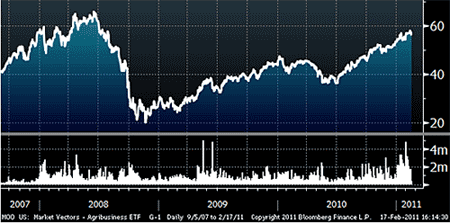Why emerging markets are now lagging the West
The mood on emerging markets has changed for the worse lately, as inflation and political unrest makes nervous investors seek shelter in more developed economies. But while emerging markets are certainly performing worse than their Western peers, says Cris Sholto Heaton, that doesn't mean the boom is over.

Get the latest financial news, insights and expert analysis from our award-winning MoneyWeek team, to help you understand what really matters when it comes to your finances.
You are now subscribed
Your newsletter sign-up was successful
Want to add more newsletters?

Twice daily
MoneyWeek
Get the latest financial news, insights and expert analysis from our award-winning MoneyWeek team, to help you understand what really matters when it comes to your finances.

Four times a week
Look After My Bills
Sign up to our free money-saving newsletter, filled with the latest news and expert advice to help you find the best tips and deals for managing your bills. Start saving today!
"Asia's hyperinflation problem," yelled one particularly sensational headline I saw last week. And with that, I knew that the mood on emerging markets had definitely changed for the worse.
The latest Merrill Lynch fund manager survey bears this out. Investors have made a sharp turn in their allocations, favouring developed world shares over emerging ones. Just 5% said they were overweight emerging markets, compared with 34% for the US and 11% for Europe.
But does this mean that the emerging market boom is over? Is it time to rush for the exits? I don't believe so but we may be facing a few tougher months.
MoneyWeek
Subscribe to MoneyWeek today and get your first six magazine issues absolutely FREE

Sign up to Money Morning
Don't miss the latest investment and personal finances news, market analysis, plus money-saving tips with our free twice-daily newsletter
Don't miss the latest investment and personal finances news, market analysis, plus money-saving tips with our free twice-daily newsletter
Only two markets are up in Asia this year
There's no doubt that these are unusual times in emerging markets (EMs). Since the start of the year, they've lagged developed markets by a substantial margin, as the chart below shows. That's surprising because developed markets have been rising in the last few weeks and normally when stocks are rising, EMs outperform their developed counterparts.

Performance has varied across countries, of course. But of the Asian EMs I follow, just two are in the black since the start of the year. And neither is an obvious candidate.
One is mainland China's A shares, which are closed to most foreign investors and always tend to march to a different beat to the rest of the world. The Shanghai Composite is up 4.1% (although the Shenzhen exchange, which is more geared towards smaller and medium sized private firms, is fractionally down).
And the other, even more oddly, is Vietnam, up 5.9%. Despite a very poor 2010 and continuing concerns about whether policy makers are finally getting a grip on the economy's imbalances, it seems that sentiment may be picking up. This is an interesting development and I'll do a fuller review of Vietnam in the very near future.
And that's it. Elsewhere, the indices bear out the survey I mentioned above. Investors have clearly soured on EMs for now. What's behind this shift, and is the reasoning sensible?
The first worry is obviously political risk; the world has been shaken by what's going on in the emerging markets of the Middle East. That said, abandoning all EMs on the basis of what's going on in a very specific subset of them seems to be a little short-sighted.
The other concern is inflation. This is more of a widespread issue. But again, it's vital to distinguish between different countries and different types of inflation before we all rush for the exits.
Not all inflation is alike
The distinction between headline inflation (ie including everything) and core inflation (excluding certain factors such as food and energy) can be a bit glib. After all, any inflation eats away at your purchasing power. Nonetheless it can be helpful to draw this line.
Food inflation is a big problem at present, causing a great deal of pain and unrest. It's certainly a factor behind the Middle East protests. That partly reflects rising demand growing populations with more money eat more. It's also partly down to supply shocks we've had major disruptions to many harvests this year.
Fine, but I am convinced that the flood of speculative money into commodity markets has also played a role in pushing up some prices in the short term. And it's important not to forget that prices in many Asian countries tend to pick up around Chinese New Year and fall back again afterwards due to a spike in demand over the holiday.
There's not much that can be done about food inflation immediately (other perhaps than measures to limit speculation, which will probably become a political issue if recent price rises continue). High prices are ultimately their own cure, encouraging farmers to bring more land into use and boost yields on their acreage.
Core inflation is another matter. So far, non-food inflation has been relatively well behaved in most countries. But it is starting to tick up a little (see chart below). And central banks are going to need to be alert to stop that becoming a bigger problem.

But core inflation in many ways is a 'good' problem. EMs have rising core inflation because their economies are doing well and growing quickly. They don't have a lot of spare capacity and are thus feeling inflationary pressure. This is in sharp contrast to the US, for example, where the inflation figures suggest rather weak core prices.
So in this sense, core EM inflation is a sign of strength. Markets are (as usual) unhappy in the short-term about the prospect of rates going up to keep it under control. But it's important to remember that this is a sign that underlying conditions in these countries are good. This should in due course keep earnings strong and lift shares.
It's worth repeating that conditions in most EMs remain much better than in the West. This is true in terms of growth, investment, financial leverage, the willingness of banks to lend and many other factors including intangible ones such as sentiment. And this is something that most markets except for equities seem to recognise. Take currencies, foreign currency debt, local currency debt, or credit default swaps. Except for certain specific countries, these have not really moved in the last few weeks.
I don't want to be completely glib about the inflation outlook. In China, for example most of the recent inflation there is food-driven and principally down to supply shocks. That said, there is reason to think that the disinflationary forces we've seen in the Chinese economy for many years may be on the way out.
The evidence suggests that the labour market is becoming tighter as the country's demographic dividend (its population bulge of young workers) dwindles. And in addition to any pressure this puts on wages, most provinces are pushing up minimum wages more strongly than before. If this boosts incomes, it will help to rebalance the economy towards consumption and away from inflation over time. But it means that trend inflation could be somewhat higher than in the days when China had abundant cheap labour.
So central banks will have to work harder in the years ahead than they have before. And rates may have further to go than many expect. But if this is because of strong demand and demonstrates policymakers are willing to do whatever is needed to stop inflation getting out of hand, then ultimately this won't bring an end to the EM bull market.
How to hedge against food inflation
There's onequick question to ask about the recent sell-off which countries have suffered most? In Asia, it was India, Indonesia, the Philippines and Thailand. Others have been much more muted: Malaysia is barely down, for example.
Three of these India, Indonesia and Thailand are among the markets that saw the highest net inflows in 2010 relative to their size. So there is probably a strong element of profit taking on a crowded trade. I suggested this was a risk especially with regard to Indonesia late last year.
I suspect that the hot markets will underperform less-favoured ones over 2011: as noted before, I think Singapore and Taiwan are more attractive prospects rights now. And it's likely that emerging markets in general will continue to lag behind developed ones for a few months because sentiment is now set against them. But if the inflation problem peaks later this year and EM valuations are looking relatively attractive, I think we'll see these outflows reverse quite rapidly.
So I definitely don't see any reason for long-term investors to pull out of emerging markets now. Although, as ever, they are not suitable for money you might want to take out in a hurry. That said, many investors are wondering about ways to hedge the risks, particularly of even higher food inflation and I've been giving that question some thought recently
The first impulse is to invest in the commodities themselves, through instruments such as exchange-traded commodity trackers. But I'm not sure that this is the best way to think about it.
We've seen agricultural commodity prices push up a long way on the back of the factors I mentioned above supply shocks, with some boost from strong demand and speculation. This could be enough to take them further. But I think it's unlikely that these factors alone will be enough for another long-lasting spike of the size we've already seen.
Adding another 50% or so to food prices would more likely be driven, or accompanied, by a huge spike in input costs such as fertiliser. So I would be more inclined to look at that part of the supply chain.
Tim Price, who writes the Price Report newsletter for MoneyWeek, recently recommended the US-listed Market Vectors Agribusiness ETF (US:MOO) for this reason and I agree with him. (If you'd like to know more about Tim's letter or sign up for a free trial, please call our customer service team on 020 7633 3635 he covers a wide range of different topics and investments and it's always an interesting read.)
MOO holds fertiliser, spray and seed stocks such as Potash Corporation of Saskatchewan, Monsanto, Mosaic, Syngenta, Yara and Agrium. All should benefit from rising input prices. I think its brief history suggests that it's rather well linked to inflation. It rose throughout the first half of 2008 even while the rest of the market was falling, before tumbling as prices no longer became the top concern.

This is a little outside my usual remit in MoneyWeek Asia. But I think it's well worth taking a look at if you're looking for a way to play this theme.
This article is from MoneyWeek Asia, a FREE weekly email of investment ideas and news every Monday from MoneyWeek magazine, covering the world's fastest-developing and most exciting region. Sign up to MoneyWeek Asia here
The Price Report is a regulated product issued by MoneyWeek Ltd.
Get the latest financial news, insights and expert analysis from our award-winning MoneyWeek team, to help you understand what really matters when it comes to your finances.

Cris Sholt Heaton is the contributing editor for MoneyWeek.
He is an investment analyst and writer who has been contributing to MoneyWeek since 2006 and was managing editor of the magazine between 2016 and 2018. He is experienced in covering international investing, believing many investors still focus too much on their home markets and that it pays to take advantage of all the opportunities the world offers.
He often writes about Asian equities, international income and global asset allocation.
-
 Could Chinese investments race ahead in the Year of the Horse?
Could Chinese investments race ahead in the Year of the Horse?As the Year of the Horse begins, we highlight the trends and sectors that could make great Chinese investments for the coming Lunar year
-
 Can mining stocks deliver golden gains?
Can mining stocks deliver golden gains?With gold and silver prices having outperformed the stock markets last year, mining stocks can be an effective, if volatile, means of gaining exposure